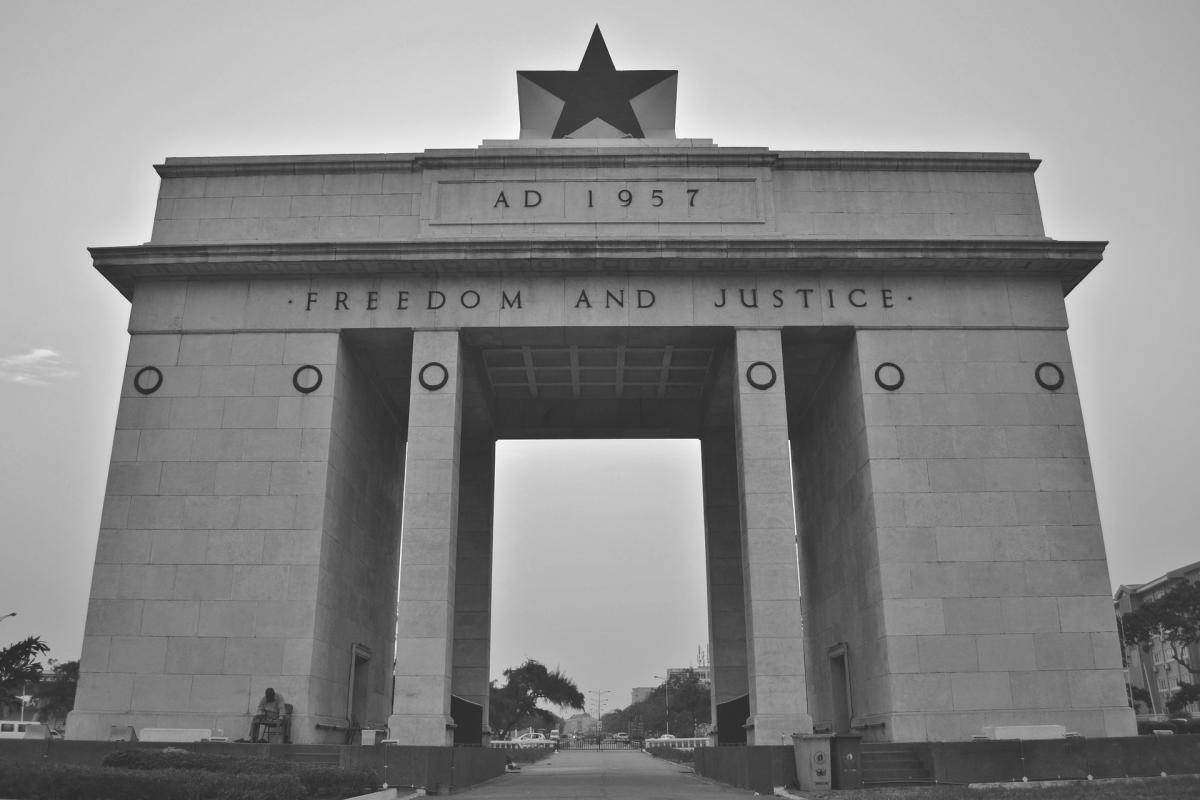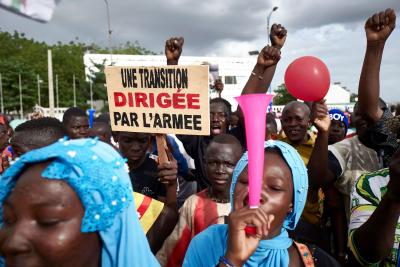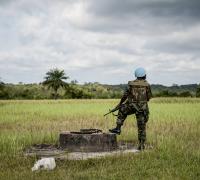
West African democracies are in reverse, but the solution must come from within
In West Africa the optimism of the 90s has given way to disappointment in the face of economic inequality, democracy in reverse, the threat of terrorist groups, and international interventions which, in many cases, have made things worse, says professor and expert in African security and terrorism Kwesi Aning.
‘Deepening state fragility, challenges to state authority, democratic reversals, a demographic boom, climate change – leading to communal conflicts we never thought would happen – and finally a sharpening disparity between those who reap the profits of growth and those who feel excluded’.
This is Kwesi Aning’s short answer, when asked about the most important security challenges in West Africa right now. In addition to his position at the Kofi Annan International Peacekeeping Training Centre in Ghana, Aning is Professor of Peacekeeping Practice at Kennesaw State University, Atlanta, and he has held several trusted positions in the African Union, the UN and the World Economic Forum, with a special focus on security and terrorism in Africa. He is visiting DIIS for the next two months during which he will co-author a report on the biggest current security trends in West Africa.
When we asked him to scratch the surface of this multi-facetted topic for us, he told a story of democratic processes across West Africa that are increasingly challenged, leaving spaces both for serious security threats and for radicalisation.
Democracy in reverse
‘The 1990s was an optimistic period; African states and civil society along with other partners succeeded in encouraging democratic processes and promoting the separation of power, accountability and transparency. In the early 1990s democratic elections were held that ushered many civil society leaders into power. But, 30 years later and with all the democratic institutions in place the more things seem to have changed, the more they have stayed the same.
The optimism of the early 1990s is giving way to frustration, a sense of missed opportunity and, most disturbingly, an increasingly monetised and violent form of governance
Countries like Nigeria, Benin, Ghana, Guinea, Togo and La Côte d'Ivoire have more or less had the same political elites in power since then, and now the optimism of the early 1990s is giving way to frustration, a sense of missed opportunity and, most disturbingly, an increasingly monetised and violent form of governance. At the same time, the economic growth has not been accompanied by development, meaning that ordinary people have been excluded from the benefits of this growth’.
What remains of the golden 90s is mostly an empty shell according to Aning: eroded and hollowed-out democratic institutions that are increasingly unfit for purpose and underfunded, and prosperity in which only a small elite has been allowed to partake.
‘Democratic institutions are only as democratic as the people make them out to be. In every country in West Africa, governments have been voted for and elected in, but nothing is changing. We are not getting stronger institutions; they are not effective, they are not independent, and they are not sufficiently funded by the state to deliver on their mandates. For example, Mali’s parliament prior to the coup d’état was incapable of reining in the corruption of the government. Ghana’s Special Prosecutor has not managed to bring one corruption case successfully to an end since its establishment in February 2018.
After two decades of positive democratic and financial development we are now beginning to see serious reversals that must be responded to very quickly. Recent examples are the coup d’état in Mali, a threatened government in Burkina Faso and a president in Benin who is tweaking the constitution to be re-elected for a third term. Ghana has just gone through a voter registration process that has been unnecessarily violent.
These are not cases associated with strong democratic processes. Violence has become a legitimate form of political discourse, leading to an increasingly large number of citizens becoming more or less passive participants in society. Across West Africa political vigilantes, usually recruited, funded, trained and encouraged by political parties to provide security and intimidate opponents, are rife’.

Also, in spite of their mandates, the multilateral institutions on the continent have failed to step up, says Aning:
‘The multilateral institutions – The Economic Community of West African States (ECOWAS) and the African Union (AU) – have been put in place to play a preventive role and member states have signed up to protocols relating to corruption and fair elections. But let’s take Mali as an example. The country has just gone through a coup d’état. ECOWAS knew beforehand that the president of Mali was corrupt, but they never spoke up about this. Indeed, none of the member countries’ heads of state ever spoke up, either privately or publicly. It sends a message that these organisations are heads-of-state clubs and not organisations for the people’.
The failure of international interventions
The democratic decline not only gives rise to a growing dissatisfaction among the population, but also erodes the very legitimacy of the state and those in power, and with this the foundation is laid for military coups and extremism. So, where should the solution be found? Not in the global North, if you ask Aning:
‘In northern Nigeria the government is struggling to respond to the challenges of al-Qaeda and Islamic State and the support of international partners such as France in the Sahel has not been helpful. This is to a large extent due to the arrogance of much policymaking in the global North, saying “we know what you need” with very little discussion and consultation with those who deal with the crisis.
African states have never been allowed to think about their own problems – they have always been disrupted by intervention after intervention
To give one example: misguided perceptions of who the enemy is have led to fatal mistakes. Some of our earlier research on local community groups in northern Mali and Niger shows instances where social service providers have been mistaken for terrorists by external actors. This is because external forces have not understood, or known how to work with, the many hybrid forms of security and justice governance systems that exist in many African countries, where the central state apparatus often needs to cooperate with local communities and non-state actors in providing welfare services and security.
In other words: we are using a set of norms and values to evaluate a situation that needs to be looked at totally differently. African states have never been allowed to think about their own problems – they have always been disrupted by intervention after intervention. African states should instead demand or be given an opportunity to carefully think through their problems and what interventions they would need. When missions are designed in London or Paris – they don’t touch the problems’.
Despite this rather discouraging analysis, Aning does, however, see glimpses of hope:
‘In spite of the serious democratic problems there are pointers of hope, and cause for cautious optimism. West Africa’s civil societies are increasingly getting stronger and more specialised. Though abused and ridiculed, they are persistent and will form the backbone for widening the space for constructive criticism and more varied and robust engagements. Above all else, more and more women are becoming a growing force to reckon with: bold, daring and vocal across public and private spaces’.
The report on megatrends in West African security and stability will be published in early 2021. It is produced as part of the Defence and Security Studies, carried out by DIIS for the ministry of defence, and the project Domestic Security Implications of UN Peacekeeping in Ghana (D-SIP), funded by the ministry of foreign affairs. Read more about the project
- Professor Kwesi Aning is Director of the Faculty of Academic Affairs & Research, Kofi Annan International Peacekeeping Training Centre, Ghana and Clinical Professor of Peacekeeping Practice at Kennesaw State University, Atlanta.
- He completed a doctorate in political science at the University of Copenhagen in 1998.
- He served with the African Union from 2005 to 2007 as the first continental expert on the Common African Defence and Security Policy and Counter-terrorism. Subsequently, he served as a senior consultant to the Department of Political Affairs of the UN in New York.
- He has served on the World Economic Forum's Council on Conflict Prevention since 2007.
- In 2006 he was appointed as the first independent evaluator of the UN’s Global Programme on Strengthening the Legal Regime against Terrorism, and between 2015–18 he served on the UN Secretary-General’s Advisory Group for the Peacebuilding Fund
- Kwesi Aning has over 150 publications to his name including books, book chapters, journal articles and policy briefs.
DIIS Experts




